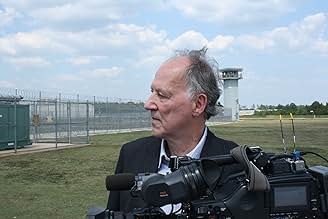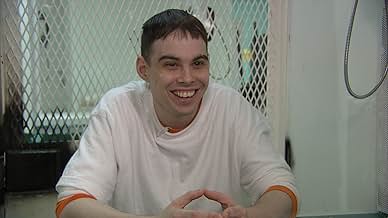Conversations with death row inmate Michael Perry and those affected by his crime serve as an examination of why people - and the state - kill.Conversations with death row inmate Michael Perry and those affected by his crime serve as an examination of why people - and the state - kill.Conversations with death row inmate Michael Perry and those affected by his crime serve as an examination of why people - and the state - kill.
- Awards
- 2 wins & 13 nominations
Werner Herzog
- Self - Narrator
- (voice)
Richard Lopez
- Self - Death House Chaplin
- (as The Reverend Richard Lopez)
Michael Perry
- Self - Death Row Inmate
- (as Michael James Perry)
Melyssa Thompson-Burkett
- Self - Jason Burkett's Wife
- (as Melyssa Burkett)
- Director
- Writer
- All cast & crew
- Production, box office & more at IMDbPro
Storyline
Did you know
- Quotes
Fred Allen: Hold still and watch the birds. Once you get up into your life like that, and once you feel good about your life, you do start watching what the birds do. What the doves are doing. Like the hummingbirds. Why are there so many of them.
- ConnectionsFeatured in Ebert Presents: At the Movies: Episode #2.17 (2011)
- SoundtracksEnd Credits and Incidental Music
(untitled)
Composer: Mark De Gli Antoni
Sebastian Steinberg - guitars and contra bass.
Lisa Germano - violins.
David Byrne - guitar.
Peter Beck - winds.
Colin Stevens - instrument designs.
Mark De Gli Antoni - keyboards and percussion.
Featured review
You know and value Herzog because he's one of few these days who can offer a glimpse of cosmologic infrastructure. The wheels and chains that move the world beneath the stories we make up to describe it. What he does, is that he frames chaotic nature where it has a story to tell - say a man living with bears, or an island about to explode - builds this as opera while maintaining the illusion of spontaneous life, blurring document with fiction, then uses this to bring to the surface an image that explains the madness of those stories. A boat being tugged over a hill, as pure as this.
The story here is about death-row inmates awaiting execution in a Texas penitentiary, structured so that we absorn not just the heinous, meaningless crime but the broader world that leads up to it, allows it to happen, is dependent on and reflects it. Broken homes, unemployment, casual street violence, Herzog provides enough background detail to ground this in a larger systemic failure: so-called civilized society as only a facade of chaotic nature left to seed.
As with Caves the previous year, the film is talky, dependent on people being able to conjure an experience we only have a handful of images for; the crime scene, dried blood still spattered on the walls, the quietly ominous-looking execution chamber, the prison cemetery lined with crosses of the executed.
And this is the whole point. Here is a story of immense, sobering power, interviewing a man who will be dead by Monday, but of course Herzog cannot film the moment, much to the chagrin of many. He has to tell a story around it.
No, the point is that we only have words, memories, stories to say. Many of these are recounted in the film. The execution itself is pieced together from objects and testimonies, very much like we would process a memory. But these stories are still powerful enough to decide life and death. Two were convicted for the crime, and going beyond who pulled the trigger, since both planned for it, only one was sentenced to die.
This is what is so sobering to me; one man just had a better story to tell the court, more touching drama to explain his being, and we get to note this in the film for a clear effect, he's just more agreeable to listen to, appears more responsible, more level-headed and contrite, whereas the other is just a little wacky. Asked about a story, he blurts out something about monkeys and camp. Herzog himself is markedly disinterested in him, whereas a lot of time is devoted to the man who isn't going to die, a long soliloquy by his guilt-wracked father - serving life in the same prison - that we presume is as sentimental as he pled to the court with it.
The bitter, hard-to-swallow truth is that this guy's life is simply better movie material, makes for a better story, and this decides life - notice too his wife's sappy story about their first encounter, misty-eyed soap as it is.
So even though the film seems more streamlined and ordinary for Herzog, talky opposed to visually primal, it is as pure as he ever delivered, perhaps without himself knowing it.
The whole system we have devised to support life, call it state, society, civilization, is not an infallible, impartial machine but hinges on the bias of storytelling and emotion. The law is arbitrary, equally chaotic as what is meant to organize. At the bottom of that, there is only time and emptiness.
Observant Herzog fans will note that he used this intertitle - 'Time and Emptiness' - for the closing segment of his Buddhist documentary Wheel of Time. See if you can spot the powerful connection between these two, the floating worlds and ritual they portray.
The story here is about death-row inmates awaiting execution in a Texas penitentiary, structured so that we absorn not just the heinous, meaningless crime but the broader world that leads up to it, allows it to happen, is dependent on and reflects it. Broken homes, unemployment, casual street violence, Herzog provides enough background detail to ground this in a larger systemic failure: so-called civilized society as only a facade of chaotic nature left to seed.
As with Caves the previous year, the film is talky, dependent on people being able to conjure an experience we only have a handful of images for; the crime scene, dried blood still spattered on the walls, the quietly ominous-looking execution chamber, the prison cemetery lined with crosses of the executed.
And this is the whole point. Here is a story of immense, sobering power, interviewing a man who will be dead by Monday, but of course Herzog cannot film the moment, much to the chagrin of many. He has to tell a story around it.
No, the point is that we only have words, memories, stories to say. Many of these are recounted in the film. The execution itself is pieced together from objects and testimonies, very much like we would process a memory. But these stories are still powerful enough to decide life and death. Two were convicted for the crime, and going beyond who pulled the trigger, since both planned for it, only one was sentenced to die.
This is what is so sobering to me; one man just had a better story to tell the court, more touching drama to explain his being, and we get to note this in the film for a clear effect, he's just more agreeable to listen to, appears more responsible, more level-headed and contrite, whereas the other is just a little wacky. Asked about a story, he blurts out something about monkeys and camp. Herzog himself is markedly disinterested in him, whereas a lot of time is devoted to the man who isn't going to die, a long soliloquy by his guilt-wracked father - serving life in the same prison - that we presume is as sentimental as he pled to the court with it.
The bitter, hard-to-swallow truth is that this guy's life is simply better movie material, makes for a better story, and this decides life - notice too his wife's sappy story about their first encounter, misty-eyed soap as it is.
So even though the film seems more streamlined and ordinary for Herzog, talky opposed to visually primal, it is as pure as he ever delivered, perhaps without himself knowing it.
The whole system we have devised to support life, call it state, society, civilization, is not an infallible, impartial machine but hinges on the bias of storytelling and emotion. The law is arbitrary, equally chaotic as what is meant to organize. At the bottom of that, there is only time and emptiness.
Observant Herzog fans will note that he used this intertitle - 'Time and Emptiness' - for the closing segment of his Buddhist documentary Wheel of Time. See if you can spot the powerful connection between these two, the floating worlds and ritual they portray.
- chaos-rampant
- Mar 17, 2012
- Permalink
- How long is Into the Abyss?Powered by Alexa
Details
Box office
- Gross US & Canada
- $223,880
- Opening weekend US & Canada
- $47,559
- Nov 13, 2011
- Gross worldwide
- $393,714
- Runtime1 hour 47 minutes
- Color
- Sound mix
- Aspect ratio
- 1.78 : 1
Contribute to this page
Suggest an edit or add missing content






























